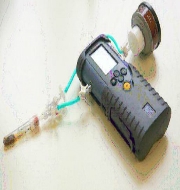Researchers build super-sensitive e-nose
Researchers from the University of Leuven (KU Leuven) in Belgium have built a super-sensitive electronic nose comprising of chemical sensors metal-organic frameworks (MOFs).
The super-sensitive e-nose has ability to detect pesticides and nerve gas in very low concentrations by analyzing their chemical makeup.
Key facts
- MOFs are like microscopic sponges. They can absorb quite a lot of gas into their minuscule pores.
- This MOF is the most sensitive gas sensor to date to detect very low concentrations/traces of dangerous substances.
- Potential applications: In medical field it can be used to screen someone’s breath for detecting diseases such as lung cancer and multiple sclerosis (MS) in an early stage.
- These chemical sensors can easily be integrated into existing electronic devices which will allow to examine other applications as well
The best-known and commonly used e-nose is the breathalyser. It used by police for checking alcohol consumption of car drivers. It is a chemical sensor that measures the amount of alcohol in the breathe car driver.
Month: Current Affairs - July, 2016


